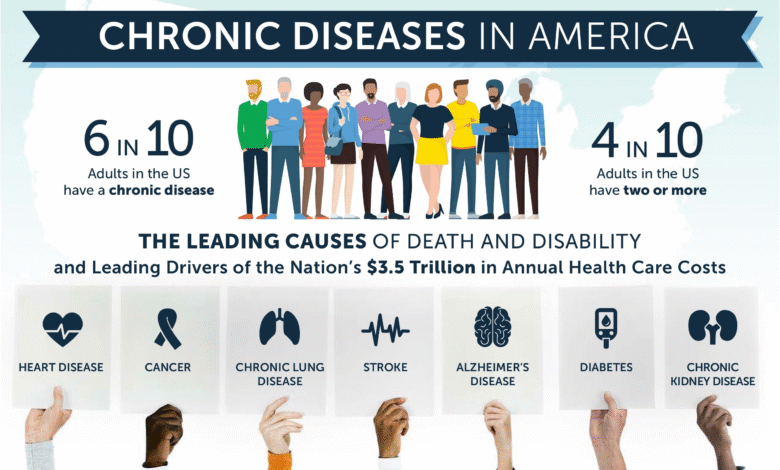Chronic Illnesses in America: A Looming Health Crisis

Chronic illnesses in America have reached alarming levels, with millions of individuals facing the challenges posed by conditions such as diabetes, obesity, and hypertension. Recent reports highlight a growing epidemic, reflecting concerning diabetes rates in the US and an unsettling obesity epidemic that continues to grow. With around 133 million Americans affected by chronic diseases, these health issues pose a significant burden on both individuals and the healthcare system. Alarmingly, hypertension statistics indicate that many remain unaware of their condition, often described as a ‘silent killer.’ Solutions are urgently needed, including effective preventative health measures that focus on improving lifestyle choices and transforming the way we think about chronic diseases.
The prevalence of long-lasting health conditions in the United States, often referred to as chronic ailments, has increasingly become a topic of critical discussion among healthcare professionals. This rising tide of lifestyle-related diseases, including metabolic disorders and cardiovascular issues, reflects a broader public health crisis that requires immediate attention. The growing rates of metabolic syndrome, particularly among children and adolescents, highlight the pressing need for interventions. With millions struggling against these persistent health challenges, exploring innovative chronic disease solutions is essential. Emphasizing wellness and preventative care can pave the way for healthier futures and improved quality of life for countless Americans.
Understanding the Chronic Illness Epidemic in America
Chronic illnesses in America are becoming increasingly prevalent, posing serious public health challenges. Reports estimate that approximately 133 million Americans are currently afflicted with at least one chronic disease, which encompasses conditions such as diabetes, hypertension, and obesity. The alarming rise in these illnesses has prompted health experts to label it as an epidemic, with the consequences significantly impacting the overall quality of life and lifespan of individuals affected. The MAHA report highlights the urgency for comprehensive strategies to address this crisis and mitigate the health struggles faced by millions.
The growing burden of chronic illnesses is not solely attributed to genetic factors but is heavily influenced by lifestyle choices and environmental conditions. For instance, the alarming rates of obesity in the U.S., coupled with rising diabetes rates, underscore a critical need for improved preventative health measures. Addressing dietary habits, promoting regular exercise, and ensuring access to healthy food options are key components in reversing these trends and fostering a healthier society.
Frequently Asked Questions
What are the current diabetes rates in the US and how do they affect chronic illnesses in America?
As of 2021, approximately 38.4 million Americans suffer from diabetes, significantly impacting the prevalence of chronic illnesses in America. This increase in diabetes rates contributes to a wider public health crisis involving obesity, hypertension, and other chronic diseases, underscoring the need for preventative health measures.
How is the obesity epidemic linked to chronic illnesses in America?
The obesity epidemic is intricately linked to various chronic illnesses in America, including diabetes and hypertension. A staggering 350,000 children have been diagnosed with diabetes, with obesity exacerbating these conditions. Addressing obesity through improved nutrition and exercise is critical for managing chronic diseases.
What are the hypertension statistics in America and their relation to chronic diseases?
Hypertension, often referred to as the ‘silent killer,’ affects millions of Americans and is associated with severe complications like stroke and heart attack. Many individuals are unaware they have hypertension, making regular health screenings vital in combating chronic illnesses in America.
What solutions exist for chronic diseases in America, particularly diabetes and obesity?
Chronic diseases solutions in America emphasize the importance of lifestyle changes such as regular physical activity and better nutrition. Healthcare providers advocate for healthier food options and encourage patients to adopt diets that reduce sugar intake to combat rising diabetes rates and the obesity epidemic.
What are some effective preventative health measures to combat chronic illnesses in America?
Preventative health measures to combat chronic illnesses in America include promoting regular exercise, healthy dietary choices, and public education about the risks associated with poor nutrition. The MAHA Commission stresses that improving food systems and transparency is essential to safeguard public health and prevent chronic diseases.
| Key Points | Details |
|---|---|
| Chronic Illness Epidemic | Over 133 million Americans suffer from at least one chronic illness. |
| Common Illnesses | Diabetes, hypertension, and obesity are the most prevalent chronic diseases. |
| Impact on Children | Over 350,000 children have diabetes, with more than one in four adolescents affected. |
| Silent Symptoms | Hypertension is called the ‘silent killer’ as many may not know they have it. |
| Need for Action | Regular exercise, improved nutrition, and awareness are essential to combating chronic diseases. |
| The Role of Mental Health | Chronic illnesses adversely affect mental health, increasing stress and inflammation. |
Summary
Chronic illnesses in America are reaching alarming rates, affecting millions of individuals with diseases such as diabetes, hypertension, and obesity. The recent MAHA report highlights the urgent need for addressing these health challenges, especially among children, where the prevalence of diabetes is increasingly common. Despite significant healthcare spending, preventive measures like improved nutrition and physical activity remain crucial. Addressing these lifestyle factors can significantly impact public health and the overall well-being of Americans.




